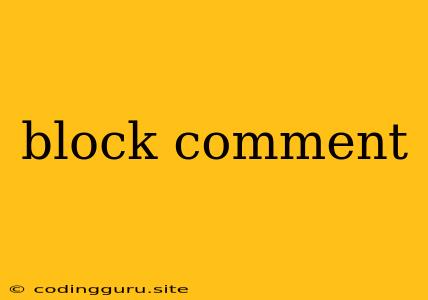What are Block Comments?
In the realm of programming, comments are essential tools for developers to explain their code, enhance readability, and provide context for future understanding. While single-line comments are valuable for concise explanations, block comments come into play when you need to provide more extensive documentation or temporarily disable larger sections of code.
Block comments, also known as multiline comments, allow you to enclose a block of text that the compiler or interpreter will ignore during execution. This means that anything within the designated boundaries of a block comment will not be considered as part of the code, making it ideal for:
- Explaining complex code sections: When dealing with intricate logic or algorithms, block comments can provide detailed explanations, making the code easier to comprehend for both yourself and others.
- Disabling code temporarily: During development, you might want to temporarily deactivate certain portions of code for testing or debugging purposes. Block comments allow you to do this quickly and efficiently.
- Adding notes and reminders: Block comments can serve as a space for storing important notes, reminders, or even copyright information within your code.
How to Write Block Comments in Different Languages:
Block comments syntax varies slightly across programming languages. Here's a breakdown for some popular languages:
C/C++/Java/C#:
/* This is a block comment.
It spans multiple lines and is ignored by the compiler. */
The opening delimiter is /* and the closing delimiter is */.
Python:
""" This is a block comment in Python.
It can span multiple lines and is used for documentation purposes. """
Python uses triple quotes (either single or double) for block comments. These comments are also used for documenting functions and classes.
JavaScript:
/* This is a block comment in JavaScript.
It spans multiple lines and is ignored by the interpreter. */
Similar to C/C++, JavaScript uses /* and */ as delimiters for block comments.
PHP:
PHP uses the same /* and */ delimiters for block comments.
Swift:
/* This is a block comment in Swift.
It spans multiple lines and is ignored by the compiler. */
Swift follows the same pattern as C/C++ and JavaScript, using /* and */ for block comments.
Best Practices for Using Block Comments:
- Keep them concise and to the point: Don't write lengthy, rambling comments. Focus on providing clear explanations and relevant information.
- Use proper formatting: Indentation and spacing can make block comments more readable.
- Avoid excessive comments: Too many block comments can clutter your code. Only use them when necessary.
- Update comments regularly: When you modify your code, make sure to update the accompanying comments to reflect the changes.
Benefits of Using Block Comments:
- Improved code readability: Block comments help clarify complex code logic and make it easier for other developers (or your future self) to understand your code.
- Easier code maintenance: When you need to modify or debug your code, block comments can provide valuable insights into the purpose and functionality of different sections.
- Facilitated collaboration: By using clear and concise block comments, you can foster better collaboration among team members working on the same project.
Conclusion
Block comments are indispensable tools for developers. They enhance code readability, facilitate debugging and maintenance, and improve overall code quality. By effectively using block comments, you can create more understandable and maintainable code, ultimately benefiting both your team and your project.
